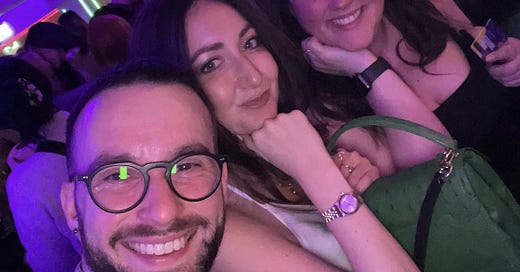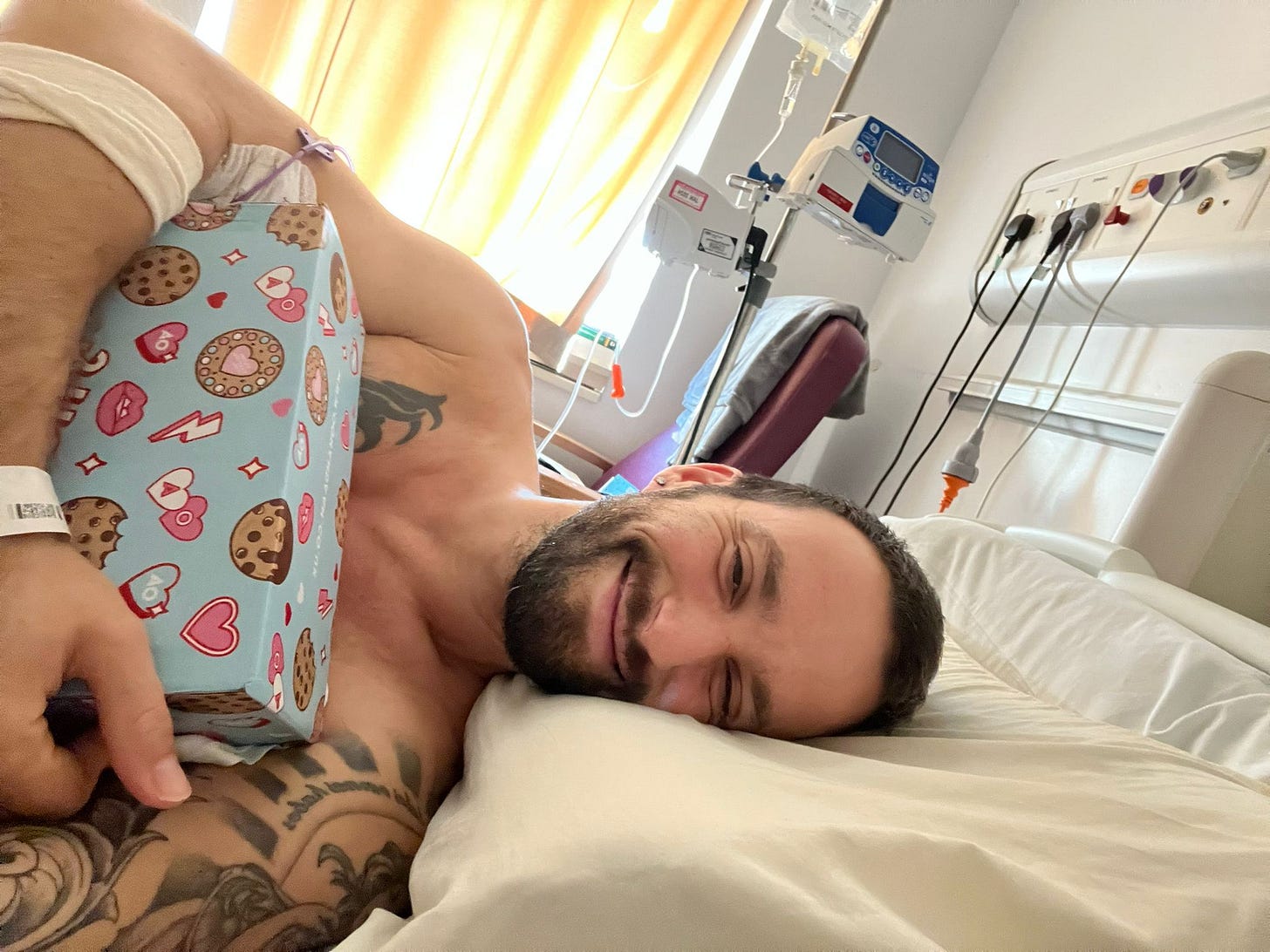My friend Alex died two weeks ago. He was 33.
Aside from the blood cancer that silently tortured his organs, he was enviably healthy. Alex was – and I am not just saying this – the best person in most rooms he walked into. He was the type of person who’d meet a friend of a friend and immediately start addressing them by an endearing nickname he’d just invented. If someone said something mildly ridiculous, he’d shoot you a look that made it impossible not to run away in hysterics. He’d pick you up and drive you everywhere – waiting outside the door to make sure you got the key in the lock alright. On every death, break up or general freak out, he’d turn up at the door unannounced with a beaming smile and shout: ‘Oh come here you!’ Within five minutes of arriving at my Hen party he was wearing a pink sash that read ‘BIRTHDAY GIRL’ (turns out he stole it from of the other tables) and was Dutty Wining next to a group of middle aged women. In his nine months of treatment – including 61 rounds of chemotherapy – he never complained.
Well, apart from one time. About a month before he died, Alex texted me about hospital food. It read: ‘Eve, I’d love to do an article or research on hospital food. How much they’re spending, the nutritional value, what this would do for waiting times and getting patients healthier and out of hospital. I’ve said when I’m better I want to make it my mission. I’m so lucky I’ve got family to bring things in. If I had that to live off for all the months I’ve been in hospital, I’d be dead!’
Image: Dan McCourt
I expect I’ll regret my reaction forever. I eye-rolled and placated Alex with some vacuous crap about how we’d covered the topic before and it’s not actually as simple an issue to solve as you might think. I didn’t want to get into it.
I have written about hospital food before. At the end of 2019 I did a big number on it for The Mail on Sunday. Well, I did a big number on Prue Leith and her new role as Government advisor on hospital food standards. I picked holes in the line she seemed to trot out regularly: if only patients were served healthy, home cooked, delicious-looking meals, they’d come out stronger and better-equipped to recover from having their organs sliced open. It’s estimated that about 80,000 of the 140 million meals served to hospital patients every year go untouched.
The thing is, generally speaking, the reason for this isn’t because they look and taste like shit. A load of research shows getting hospital patients to eat anything at all is the biggest hurdle. Treatment-related nausea is a thing, but also – nursing staff, or a lack thereof. Many of the studies I read cited countless situations where patients are left off of meal lists by accident, or aren’t given the assistance they need to bring a fork to their lips. Sometimes patients fall asleep during meal times and staff are too busy to wake them up or remember they missed the previous meal.
The implicit message of this stance gives big ‘food is medicine’ vibes which, as those familiar with my work will know, I am not here for. There are very specific cases were food is actually medicine (malnutrition/eating disorder treatment/diabetes). But eating vegetables won’t make a cold go away quicker, or help an autoimmune disease – and it certainly won’t cure cancer. There’s whispers of blame and judgement – if only you’d have bought a blender you’d be halfway to sunny Mexico by now, a picture of health.
But I guess Alex made me realise something I’d been missing. As his treatment went on, and his odds got increasingly bleak, my friend’s desire to exercise control over his dicey situation grew. He began to say things like: ‘I’ve been so good!’ and ‘I’ve been eating and drinking all good stuff!’ He’d post pictures of a kitchen worktop decorated with green veg and juices. It didn’t make me feel as uncomfortable as I thought it would. Despite seven years of passionate campaigning against BS health advice, a little part of me thought: ‘Maybe the vegetables will do the trick.’ As a person adoring of another person facing death, I had to clutch on to something – anything that might save him. And if I felt that way, imagine how it was for Alex.
In the face of an uncontrollable situation, searching for agency is a basic survival tactic. The psychological comfort of control should never be underestimated. Even if the results are likely to be negligible. After all, you might be within the 0.1 per cent of cases where something unexpected, like extra energy to fight until the next new treatment comes along, works. In other words; eating healthy food in hospital makes you feel like you’re doing everything you can to control the uncontrollable. And that’s a type of medicine.
Also Alex loved his food – and ate loads of it. Whether or not the pair of us would attend a Christmas party depended on the quantity of free food on offer – and how rank it was likely to be. The last time he came over it had been an hour since his last meal, so naturally I had to make him a bagel. It wasn’t until my friend was confined to a hospital bed for three months that I even considered the actual heartache of an endless menu of crap, mushed-up food. Especially if future meals may be limited. The thought of Alex being denied the simplest of pleasures – on top of everything else – was physically painful. Thankfully an army of feeders were a phone call away – and hand delivered Tupperware of homemade roast fish and vegetables. There was also Deliveroo (many a driver got lost in the maze of St Batholomew’s hospital because Alex demanded they bring his food to his private room). And so they should. I sent him cookies (below).
Perhaps this piece is way of processing the whirlpool of feelings I have about my wonderful friend, the horror of what happened him, and the gaping hole in my heart. Maybe it’s an apology. I guess the long and short of it is, I was wrong. The food we give to hospital patients does matter. Because it matters to patients. Not all of them have lost their appetite. Some are craving a good meal. Some don’t know how many they will have left.
Please give generously to Children With Cancer in memory of Alexander Pepe here.






